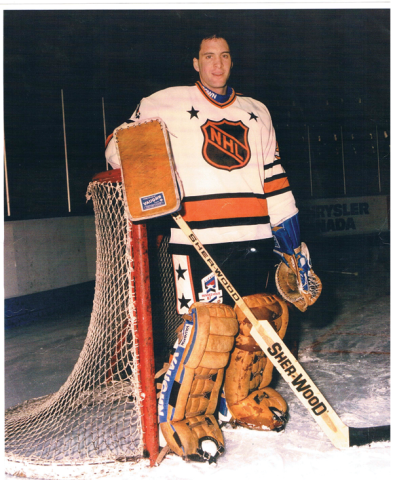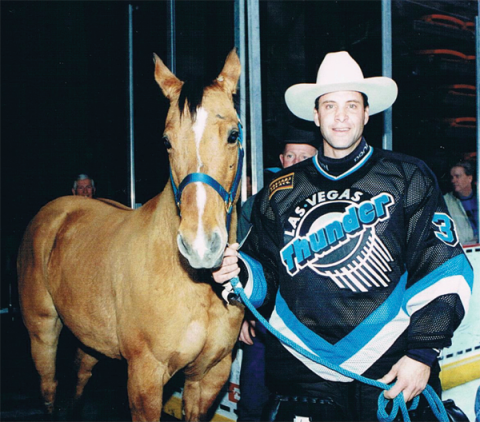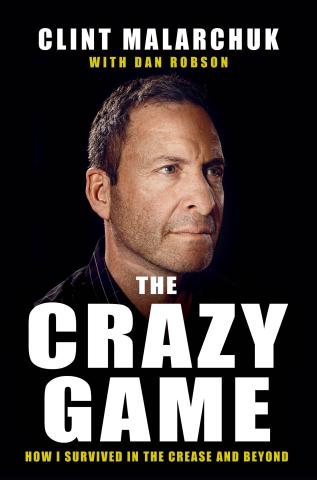
Malarchuk, the Sabres' goaltender, got involved in an accidental collision with Blues player Steve Tuttle, whose skate clipped Malarchuk's throat, severing his carotid artery. He almost died from the gruesome injury. Miraculously, 10 days and 300 stitches later the tough-as-nails cowboy from Grande Prairie, Alberta would be back on the ice.
It would not, however, be the last time Malarchuk had a brush with death.
Obsessive compulsive disorder (OCD), anxiety, depression, alcoholism and a post-traumatic stress disorder (PDSD) relating to his throat injury that didn't get diagnosed for almost two decades all dogged Malarchuk.
There were bar fights, drunken rampages and an overdose on pills and booze where his heart stopped momentarily. The worst, though, came on Oct 7, 2008 when Malarchuk shot himself in the head in front of his wife Joanie in a suicide attempt.
Malarchuk survived — again — this time with a bullet permanently lodged in his brain.
After a painful, lengthy rehab stay and an uncomfortable, cathartic autobiography called The Crazy Game, Malarchuk has come out the other side a survivor and someone who hopes his story can now help others.
Samaritanmag spoke with Malarchuk before his appearance at the RendezVous With Madness film festival in Toronto on Nov. 15 where he'll be part of a live podcast recording for The Mental Illness Happy Hour. The fest will also screen Cutthroat, ESPN’s 30 for 30 film about Malarchuk. Additionally, he'll be signing copies of The Crazy Game.
Your first NHL game was in the 1981-82 season. But in the minors in San Diego in '92-'93 was the first time that you felt you got "proper" help, correct?
“Yeah, there is probably a two-year period where I was trying to get the help. But that was the saving doctor (Dr. Stephen Stahl).”
At that point you had already played pro for 12-13 years. The fact that it took you that long to find the right connection, is that typical?
“The fact that anti-depressants take about six weeks to get in your system to see if they'll work, they start getting in your system and you'll start to see some gradual improvement around three or four weeks. But if there's nothing by six weeks you've got to try a different one. So that trial and error gets longer and longer. So that kind of led into the two-year period of trying everything. And the doctor I saw in San Diego, he happened to be a specialist in that field and he just nailed it right away.”
So keep trying.
“I felt I had no choice but to keep trying. And the thing was, when you're trying you don't know if you're going to find the answer. And that's what gets scary. I tried four different medications and nothing helped. So you start worrying you'll never find it and you're just going to live like that forever. That gets overwhelming and scary.”
Throughout your career do you think your teammates had any indication of the turmoil you'd be going through every day?
“No. Not at all. Because I didn't want them to know either. You're hiding it. On the outside you're acting as normal as you can. And I had that reputation as a balanced guy — everybody thought I was pretty normal as far as a goalie goes — so it was very, ‘Wow, this guy, he's cool, he's this, he's that, nothing bothers him...’ Partly that was because when I was at the rink I felt a lot safer. Things weren't pressing as much. But part of it too was I wanted to make sure no one knew.”
One of the reasons why I ask is because people who haven't played hockey don't realized how tight the connections are with your teammates. You spend every waking minute with them; you shower with them; you travel on the bus with them. They know everything about you. And to hide that, well, how?
“Yeah. That's the thing. We're such good actors at hiding it. I was more at ease when I was with those guys, especially at the rink, but yeah, the struggles were when you're traveling and you're alone and you're sitting on an airplane or a bus and you're kind of alone with your thoughts... then you're acting. You're trying to be as normal as you can in a conversation. But again, sometimes it was better to be around people because alone times are the real struggles.”

“Just what you said right there is so important for my message. It's why I go into detail about my life. I was an old-school mentality bar-fighting cowboy, and a hockey player. That's why it's so important for me to portray that and be honest about that because it says that mental illness... it doesn't matter how tough you are. It can hit any person, any walk of life. You could be the toughest s.o.b. walking the earth — and sometimes I like to portray that — but I'm not. I've got this disorder, but again on that note, now that I've gone through it and learned so much from my experiences it's not a weakness, it's a sickness. And I always thought I was mentally weak because I struggled with all this stuff. And I used to think, ‘Wow, you're an NHL goalie, this isn't good.’ To have all this turmoil going on, I thought I was mentally weak. But now, looking back, I've come to the realization I must have been mentally strong, really strong, because I'm dealing with the pressures of goaltending in the NHL, but I'm also dealing with my illness.”
Men, in particular, don't talk about mental illness and don't come forward. Do you see that changing at all? When you're telling your story do you ever get, "Hey, that's me"?
“The feedback I'm now getting from people that have struggled or are struggling. It's like, ‘I'm not alone.’ It's okay to talk about it. It's okay to get help. It's okay to be a fireman or policeman or military soldier and have this. And again, it's not a weakness; it's a sickness. Society, with men especially, we all have to kind of try to be that way, right or wrong. Probably wrong. But the book has made it safe for men in general, but for men to say, "Okay, this guy seems like he's a pretty tough dude and he struggles with this stuff now, and so do I."
If he can admit it, then so can I.
“Yeah. And the fact that I'm doing good now, that gives the someone hope I can continue with my way of life if I get some help. I can get some peace of mind.”
How do you recognize your symptoms now? And how vigilant do you have to be day-to-day? Is this something that's ever-present for you? Like you can't watch certain movies? Are there triggers?
“Not now. But before, my god, I had to be on guard. Is that movie going to trigger me? Or, should I go to that event? Is it going to be overwhelming? And all the anxiety and the triggers that might set my mind off. I was very very conscious and guarded all the time. It was almost every minute. Should I do this? Should I do that? Should I read that book? Should I go to that movie? It was everything. And now I don't even think about that.”
One of the interesting things you said in the 30 For 30 doc was "If you've got OCD, use it." And if you need help, get it. To me that's a fascinating perspective and one that's rarely considered — if you have a unique perspective on the world, try to use it to your advantage. Do you think you'd have ever made the NHL if you didn't have OCD?
“I personally don't think I would have. But at that time I was in my teens and it was a more manageable OCD in a lot of ways. Sometimes it wasn't. With the OCD, with everything going on in my home life it was just something I escaped to, the hockey, and I channelled all that anxiety and working out and everything I did into the hockey. So yeah, I really believe it got me to the NHL.”
But there's a flipside to it, right?
“At that time I didn't even know anything about OCD. I didn't even know it was invented. Or diagnosed as an illness. I caution people. Like I said, if you've got OCD, to use it. And then channel it. And for me it was good. But it did overtake my life and it just got worse, probably more because of the accident in Buffalo just made everything magnified.”

“Yeah. We've come a long way, but I still think we've got to go a lot further with this. Even the book, with the feedback I'm getting, that makes me go, ‘Wow, there's a lot of people who the book helped them to maybe talk about it and get help.’ But that means it's still out there and we don't talk about it. And people are thanking me for that, so that just tells me that we still have a long way to go.
“And it's still the deal where if you have to get treatment for [a physical] illness you might miss some work or you might have to work from home or something like that, you're going to go to your boss, ‘Look, I got diagnosed with this and this is what I'm facing.’ Well, they're going to support you and be behind you. But if you're diagnosed with any mental illness, whether it be anxiety or depression or anything, you're probably not going to go to your boss and say that because they're going to look at you and go, ‘Oh, great.’
“It has got to be treated just like it's as physical as diabetes. It's a chemical imbalance. So you get your medication, your treatment or whatever and you get in balance and you're a productive worker. But it's that fear for people that still aren't able to go to the boss. So that's where we've got to get to: where the acceptance is like any other illness.”
You've got to treat it like if someone had a broken leg.
“Exactly. You can see that — ‘a broken leg, wow, that hurts.’ And with mental illness,s you can't see it and you can't say, ‘Wow, that hurts.’”
In the book, you go into great detail about how difficult rehab was, how difficult writing the book was. What do you hope going through all that actually gets to other people?
“That's why some people are amazed at how honest and detailed my wife (Joanie) and I were in the book. Even though I'm feeling good today, there was time when it was very dark and bad and there are people right now who are where I used to be. So being honest, and going into that depths and detail it was for those people so when they read it, they could relate. If I only went halfway into the detail then the people who are way down wouldn't relate. They'd go, ‘Oh well, I'm way worse’ and ‘He's better now but he wasn't as bad as I am.’
“It was very difficult. But now where we're getting people to step up and coming out and sharing their experiences it's all worth it. And I think that moving forward I'm going to continue to tell my story and get it out there that it's important that we recognize this stuff.
“To have a kid come up to me in Edmonton and say to me I saved his life a couple years ago. He was going to commit suicide. He had everything ready and he didn't. His dad knew he was struggling with stuff and he said, ‘Research this Malarchuk guy.’ And he did and this kid showed up at my book signing dressed just like me, wearing Wranglers 'n' cowboy boys 'n' everything.”
Another tough cowboy.
“Well, there you go. If it's helping people and it seems like it is, then it's very gratifying. All the embarrassing stories and everything else, it's saving lives and that's a very good feeling.
“And it's important for me to remember where I was, too. If I have a touch of depression now or anxiety, it's not panic anymore. It just fuels me to say, "Okay, I'm not where I was in the real dark place’ and it's just going forward and talking about it and helping people.”
M2k Tekno